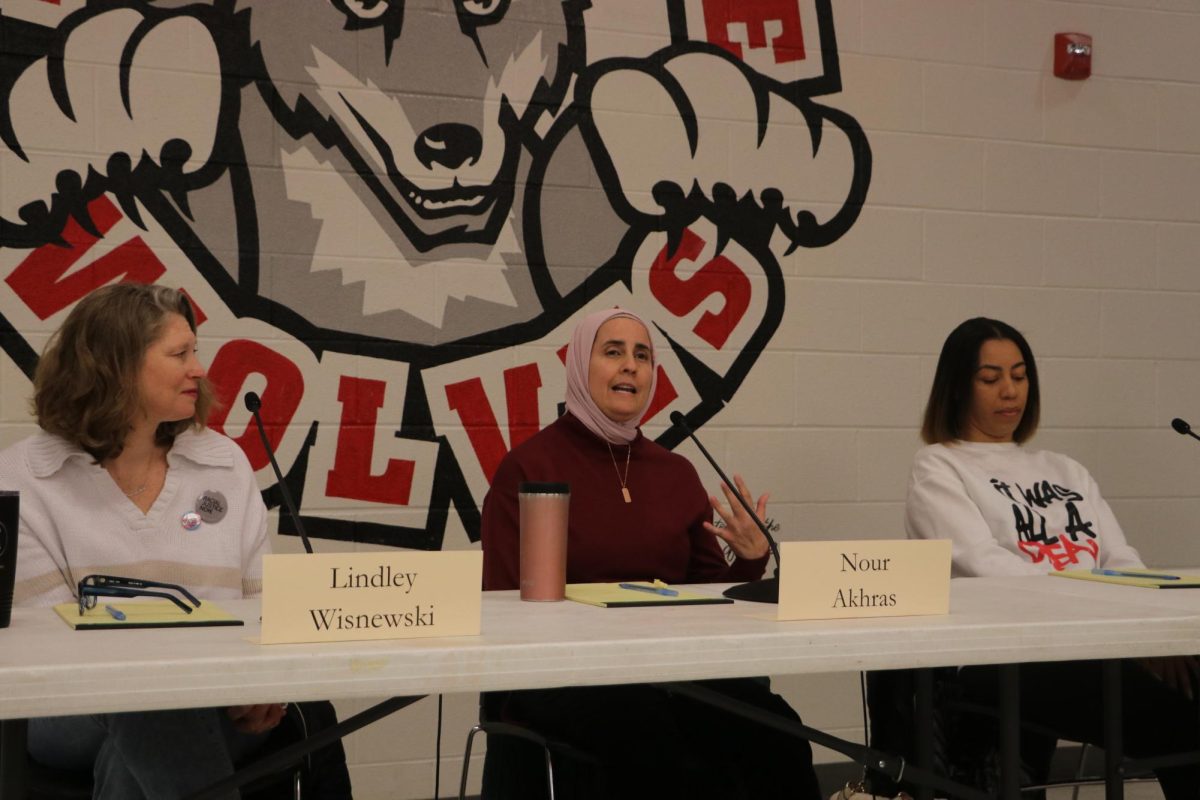The Niles Township Federation of Teachers and Support Staff (NTFTSS) endorsed three candidates, Nour Akhras, Kandice Cooley-Jones and Lindley Wisnewski, in the District 219 school board race through a social media post on March 24. The NTFTSS, the union that represents all teachers and support staff in District 219, did not endorse Eric Brown. The endorsement only consisted of a public statement and did not include any other type of support.
President of the Teachers Union and Computer Science teacher Matthew Fahrenbacher details the union’s process for getting to know candidates and making this decision. According to Fahrenbacher, the decision to endorse those three candidates was based on their questionnaire answers and an in-person meeting between the candidates and the executive board.
“As we have in past Board elections, we reached out to all the Board candidates with a questionnaire to find out why they are running, their philosophy about being a board member and what their priorities would be if elected. We’ve shared the questionnaire results on our website and directly to our teachers so that community members can learn more about the candidates. Our executive board also had the opportunity to meet all four candidates in person,” Fahrenbacher said. “One of the candidates, Eric Brown, opted not to respond to our questionnaire, which we found concerning. Based on the answers in the questionnaire and our in-person meeting, we felt comfortable recommending Akhras, Cooley-Jones, and Wisnewski.”
West Building Representative, NTFTSS Executive Board member and social studies teacher Melanie Johnson met with all of the candidates and helped make the endorsement decision.
“Generally speaking, the union was impressed with the responses given by [the endorsed candidates]; we especially valued their commitment to diversity and equity, their commitment to seeking out the input of stakeholders in the district, including the teachers and the union and their focus on improving communication with the community. Cooley-Jones and Wisnewski also have previous experience serving on the District 69 school board, and I personally felt their experience and expertise would be a valuable addition to the board,” Johnson said.
Through the endorsement, Fahrenbacher hopes to establish an open line of communication with the endorsed candidates in the future. Johnson notes that the teachers’ union advocated for candidates they believed would support policies improving education.
“Our reasons for supporting the candidates we did is based on our commitment to our students and the hope that the school board will develop and support policies that promote equitable access to quality education. We often advocate for smaller class sizes, diverse curricula and adequate support services for our students. The proof is in the questionnaires which are publicly available,” Johnson said.
West English teacher Ron Feiereisel lives in Skokie and is eligible to vote in the school board election. The endorsement positively shaped his opinion of Akhras, Cooley-Jones and Wisnewski.
“The union’s endorsement had a positive impact on my opinion of the candidates because it signals our values are aligned. For me, the most important factors in a school board candidate are prior experience in the role and a commitment to centering the voices of students and teachers in their decision-making process,” Feiereisel said.
Current school board member Joe Nowik expressed his thoughts on the endorsement via a Facebook post. Nowik, who has been on the school board since 2015, is not seeking re-election. Nowik believes that the endorsement is problematic because school board members make decisions regarding budgets, policies and contracts with teachers, staff and union-backed candidates, thus, they may not be able to negotiate fairly when they’ve received direct support from the same employees they oversee. Furthermore, he believes that union endorsements can create a board that prioritizes staff interests instead of balancing the interests of all voices that the schools serve and “broader community concerns.”
Fahrenbacher disagrees with the assertion that the endorsement causes a conflict of interest for board candidates.
“It assumes that there is a discontent between what the Union advocates for and what’s best for schools and what the community would want. But this couldn’t be further from the truth. We want our schools to be the very best places of learning for our students, and we have a shared interest in having a Board of Education that supports pro-student policies. Our entire recommendation process was centered around determining the educational philosophies and priorities behind the different candidates and whether it aligns with the values of our District. Our recommendation is a reflection of our professional judgment of a candidate’s potential to uphold those values effectively,” Fahrenbacher said.
Fahrenbacher believes that Nowik’s assertion doesn’t give the Board members enough credit for their ability to make informed choices.
“[Board members] are always weighing the impact their decisions [they] are making on students and staff while listening to different stakeholders who may have different perspectives. Taking member Nowik’s argument to its logical conclusion, board candidates should never accept an endorsement or recommendation from any group to avoid the risk of becoming beholden to that group’s point of view,” Fahrenbacher said.
Candidate Akhras believes her union endorsement does not create a conflict of interest because she prioritizes the needs of students.
“Being endorsed will not represent a conflict of interest for me because I am solely focused on the students, so if there were ever to be a conflict between the teachers’ union and the benefit of the students, I will prioritize what I believe will benefit students most,” Akhras said.
Nowik expressed another concern in his post about taxpayer money influencing elections, as teacher unions are funded by dues from employees paid with taxpayer money, and he believes a tax-funded organization shouldn’t influence who oversees it.
“When money sourced from taxpayers is used to shape school board elections, it raises serious ethical concerns. Fair elections require transparency, balance and public trust,” Nowik said.
Fahrenbacher disagrees that taxpayer money is being used to shape school board elections.
“We are not making a financial donation to any of the candidates, so I don’t understand how money is coming into this. Would it suddenly be okay for us to make a recommendation if we collected no dues? Second, I think classifying dues as payments, which are voluntary decisions made by staff to join the Union, as taxpayer funding is disingenuous,” Fahrenbacher said.
Fahrenbacher believes that the endorsement is a fundamental right of the NTFTSS.
“Participating in the democratic process – including recommending candidates – is a fundamental right and duty of any professional organization. It’s common practice for unions to share their opinion on who their overseeing person or body would be, such as firefighters, the police and more. Our engagement with the board candidates has provided additional information for the public to consider when electing the new members of the Board of Education. Member Nowik’s argument, if accepted, would disenfranchise the voices of millions of public sector workers from fully participating in the political process,” Fahrenbacher said.














